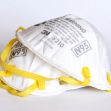Since the pandemic began, the federal government has authorized approximately $5 trillion in COVID-19 relief funds. Sadly, as President Biden said in his 2022 State of the Union address, billions of dollars have been lost to fraud. But the government is fighting back. One New Jersey chemist is headed for prison due to his $2.7 million sale of pesticides that he falsely claimed would protect against the disease and was approved by the government.
A press release from The Department of Justice announced that it is the nation’s largest fraud case related to unregistered pesticides.
Paul Andrecola, 63, of Camden, New Jersey, pleaded guilty to charges of “knowingly distributing or selling an unregistered pesticide in violation of the Federal Insecticide, Fungicide and Rodenticide Act (FIRFA).” He also pled to one count each of wire fraud and presenting false claims. His plea came before the Senior United States District Judge of the U.S. District Court for the District of New Jersey on June 9.
According to the Department of Justice, Andrecola sold “unregistered pesticides” and made false claims that alleged his products were on the Environmental Protection Agency’s (EPA) list of “Disinfectants for Use Against SARS-CoV-2.” From March 2020 at the onset of the pandemic through May 2020, Andrecola made over 150 sales of his unregistered and unproven product. His customers included police and fire departments, a medical clinic, a janitorial supply company, a school district, and “numerous government agencies,” including an Air Force base and a U.S. Marshall’s office.
A battery of investigators led to the chemist’s arrest. They came from EPA’s Criminal Investigative Division, its office of the Inspector General for the Eastern Region, the Department of Homeland Security’s Investigations Field Office in Newark, the Defense Criminal Investigative Service Northeast Field Office, the Naval Criminal Investigative Service Northeast Field Office, and the Mount Laurel Police Department.
They were motivated not only by the lost funds that were supposed to fight the virus and help people but also by a fear that the unregistered pesticide would harm those who used it. The U.S. Attorney for the District of New Jersey, Philip Sellinger said, “Andrecola’s scheme profited on the fears of the American people during the height of public safety concerns about the transmission of COVID-19.”
Andrecola’s lawyers, however, claimed that the products were “as safe and effective against coronavirus as anything else on the market” and “not dangerous.”
The evidentiary material in the case provides a chemistry lesson about the EPA and the pathogens it regulates. In order for a manufacturer or seller to make health-related claims that a product can kill pathogens, such as SARS-CoV-2, the claims must be approved by the EPA. At the onset of the pandemic, EPA created a list of approved products. Andrecola maintained that the liquids and wipes made by his three companies and sold under the brand name “GCLEAN” were on the list. They were not.
In addition, he used the EPA registration number of a different company in his marketing materials and created false documents of proof to convince purchasers that his sanitizers were approved to kill the Coronavirus.
Andrecola will be sentenced on October 1 and is likely headed for prison. The crime of selling an unregistered pesticide carries a maximum sentence of one year and a fine of up to $25,000. Wire fraud’s penalty has a 20-year sentence potential, and his false claims could add an additional five years. Fines could amount to $500,000. Part of the plea agreement includes the defendant’s agreement to forfeit more than the $2.7 million in proceeds he made from selling GCLEAN. He pledged to make “full restitution for all losses.“
His lawyer is no doubt hoping that his acceptance of full responsibility and agreement to pay restitution will reduce his sentence. On March 1, President Biden announced a series of steps that he hoped would “combat criminal fraud in pandemic relief programs.” He created an “on-going Administration-wide effort to prevent, deter, and punish…forms of pandemic fraud.” This included the appointment of a chief prosecutor in the Department of Justice, “heightened resources and enhanced penalties for egregious pandemic fraud,” and other efforts to “crackdown on COVID-19 fraud.”
Isn’t the pandemic horrible enough without people making it worse by trying to take advantage of it?






